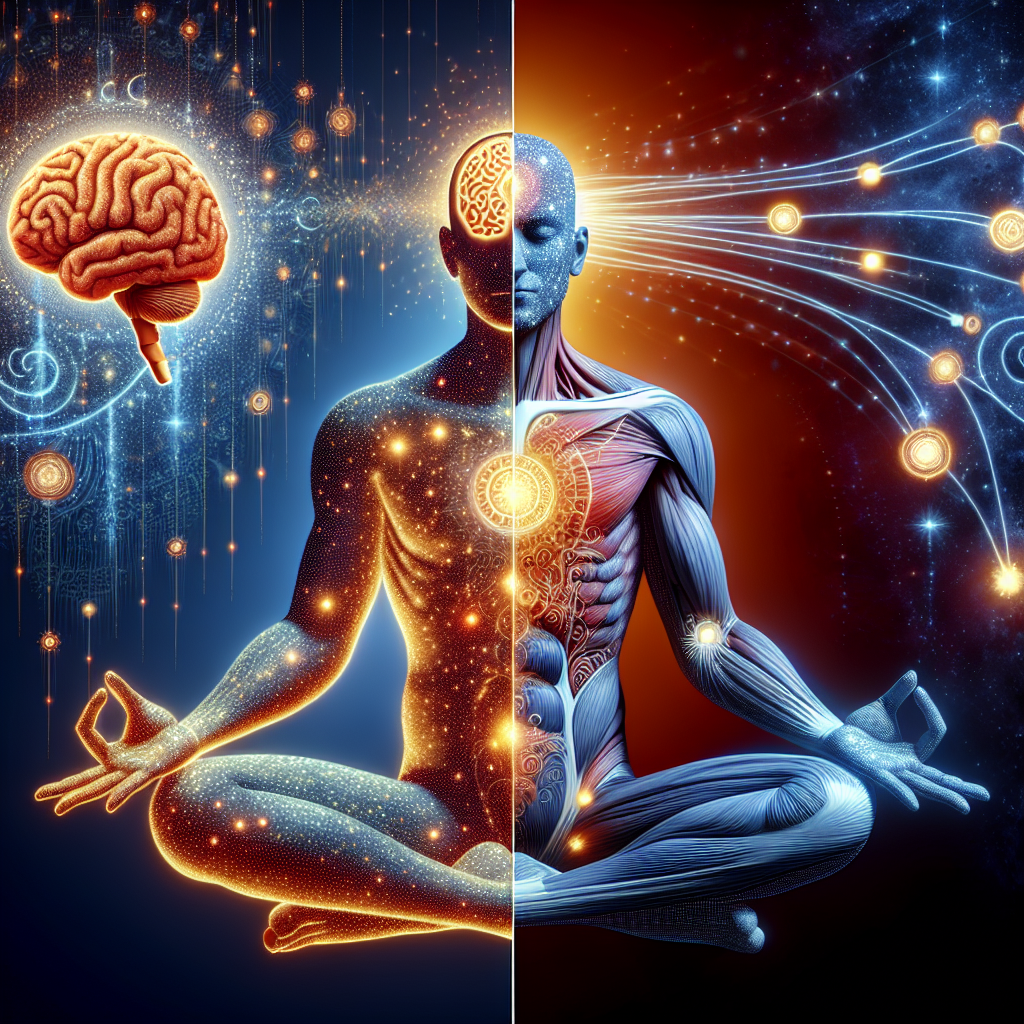What Impact Does A Strong Mind-body Connection Have On Emotional And Mental Well-being?
In the compelling exploration, “What Impact Does A Strong Mind-body Connection Have On Emotional And Mental Well-being?” you are invited to delve into the fascinating realm of mind-body connection and its significance for your emotional and mental health. The article investigates the profound attributes of a healthy mind-body synergy and its pivotal role in enhancing emotional equilibrium and mental resilience. It provides a lucid understanding of how regular mindfulness practices can fortify this connection, thereby nurturing psychological well-being. Discover how harnessing the power of a strong mind-body link can usher in a holistic wellness paradigm and enrich your life’s quality.

Understanding the Concept of Mind-Body Connection
The mind-body connection refers to the intricate relationship between our cognitive functions, such as thoughts, beliefs, and emotions, and our physical health. This idea challenges traditional Western medicine’s dualistic view that mind and body as separate entities, recognizing them as integrated and influential parts of a whole system.
Definition of Mind-Body Connection
In essence, the concept of the mind-body connection is the idea that our mental and emotional health can directly influence our physical wellness. That includes our thoughts, attitudes, feelings, and beliefs affecting our biological functions and overall health. It is a fundamental aspect of holistic therapies seeking to achieve balance and overall well-being.
Fundamentals of Mind-Body Connection
The basics of the mind-body connection center around the idea that your mind and body are powerfully intertwined. All aspects of your health, including physical, emotional, and mental health, are interconnected. A change in one area can impact the others, underscoring the importance of addressing health issues as part of a whole rather than isolating them.
The Science Behind Mind-Body Connection
Scientific studies increasingly support the notion of the mind-body connection, demonstrating how our thoughts and emotions can lead to changes in our physiology and influence our health.
Neurobiology of Mind-Body Connection
The neurobiology of the mind-body connection revolves around the interactions between the nervous system and the immune system. These two systems interact with each other, linking emotional and cognitive centers of the brain with peripheral physiological functions.
Understanding the Psychosomatic Phenomenon
Psychosomatic phenomena refer to physical ailments caused or aggravated by mental factors like internal conflict or stress. It highlights the impact the mind can have on the body, causing real physical changes and symptoms.
The Role of Hormones and Neurotransmitters
Hormones and neurotransmitters play a significant role in the mind-body connection. Hormones like cortisol and adrenaline released during stress can affect various body functions, including your immune system’s function. Similarly, neurotransmitters involved in mood regulation, like serotonin and dopamine, can impact bodily functions.
Impact of Mind-Body Connection on Mental Health
The mind-body connection has profound effects on mental health, influencing how we perceive and cope with stress, depression, and other mental disorders.
Effect on Stress and Anxiety
Your mental state, especially when experiencing stress or anxiety, activates your body’s fight-or-flight response, which can lead to various physical responses such as increased heart rate, blood pressure, and stress hormone levels.
Influence on Depression
Depression isn’t just a mental condition. It is associated with physical symptoms like fatigue, chronic pain, and digestion problems, underscoring the mind-body connection’s depth.
Connection to Thought Patterns and Mental Disorders
Certain mental disorders can manifest through physical symptoms. For instance, panic disorders may cause palpitations, sweating, or trembling, demonstrating the connection between thought patterns and physical reactions.
Cognitive Function Enhancement
There is evidence that physical well-being can significantly affect cognitive functions like memory, reaction times, and creative thinking, emphasizing the back-and-forth nature of the mind-body connection.

Impact of Mind-Body Connection on Emotional Health
The mind-body connection plays an essential role in our emotional health. It allows us to better understand and regulate our emotions, handle stress, and lead more fulfilling lives.
Emotional Regulation and Expression
Understanding the mind-body connection helps you attune to physiological responses associated with different emotions, aiding in emotional regulation and expression.
Impact on Emotional Resilience
Practicing mind-body techniques like mindfulness and meditation can enhance emotional resilience, helping you cope with adversity and bounce back from challenges more effectively.
Interplay Between Emotional and Physical Health
Cognitive processes like thoughts and emotions are known to increase vulnerability to physical disease, highlighting the profound connection between our emotional and physical health.
Mind-Body Practices for Enhancing Well-Being
Adopting various mind-body practices can help strengthen the mind-body connection, promoting better overall health and well-being.
Meditation and Mindfulness
Techniques like mindfulness and meditation decrease stress, enhance emotional regulation, and can even mitigate the symptoms of a variety of physical and mental health conditions.
Yoga and Physical Exercise
Exercise, particularly mindfulness-based practices such as yoga, can significantly enhance your mental well-being. It helps control stress, improves cognitive function, and promotes enhanced self-awareness.
Breathing Techniques and Relaxation Exercises
Deep, controlled breathing activities and relaxation exercises can decrease your cortisol levels and promote a sense of calm, helping you to manage stress more effectively.
Benefits of a Strong Mind-Body Connection
A robust mind-body connection can have a myriad of benefits, spanning from physical health to mental resilience and improved lifestyle choices.
Improved Physical Health
By understanding the mind-body connection, you can better manage stress, improve sleep, boost your immune system, and improve cardiovascular health.
Enhanced Emotional Stability
Using mind-body techniques can help regulate and understand your emotions more effectively, promoting emotional stability and mental health.
Boost in Mental Capability
Cognitive functions like focus, memory, and creativity can be improved through practicing mind-body techniques, underscoring the interplay between mental and physical wellness.
Increased Quality of Life
The enhanced physical health, mental resilience, and emotional stability stemming from a strong mind-body connection can comprehensively enhance your overall quality of life.
Advanced Practices for Advanced Mind-Body Connection
For those who wish to delve deeper, advanced techniques can offer more profound health benefits and holistic well-being.
Advanced Meditation Techniques
Advanced meditation practices such as transcendental meditation or zen meditation can deeply strengthen the mind-body connection, offering profound psychological and physiological benefits.
Holistic Healing Practices
Holistic healing practices like acupuncture, naturopathy, and Ayurveda underscore the mind-body connection’s significance, addressing health as a whole rather than isolating symptoms or illnesses.
Psychotherapy and Counseling
Psychotherapy and counseling consider the mind-body connection, treating mental health conditions based on understanding that mental and physical health are intertwined.
Impact of Mind-Body Connection on Lifestyle Choices
The improved self-awareness resulting from a stronger mind-body connection can affect your everyday decision-making, influencing aspects like diet and sleep.
Influence on Diet and Nutrition
When we understand the mind-body connection, better lifestyle choices can be made. This includes taking note of how certain foods affect your mood and physical well-being.
Impact on Sleep Patterns
Having a good grasp on the mind-body connection can promote healthier sleep patterns. You might become more aware of how your mental state before sleep affects sleep quality, prompting changes in habits and routines.
The Interplay between Lifestyle Patterns and Emotional Well-being
Your lifestyle patterns can significantly impact your emotional health. A regular exercise routine or balanced diet can improve your mood and foster emotional resilience.
Scientific Studies Supporting the Mind-Body Connection
There is burgeoning scientific support for the mind-body connection, with pioneering research in the field and numerous recent studies underlining its significance.
Pioneering Research in the Field
Early studies in the field of psychoneuroimmunology set the groundwork for the mind-body connection, uncovering interconnections between the nervous and immune systems.
Recent Studies and Breakthroughs
Recent studies backed by imagery technologies have demonstrated how activities such as meditation can materially change the brain’s structure and function, strengthening the mind-body connection.
Future Prospects of Mind-Body Connection in Health Practices
The future of the mind-body connection in health practices is propitious, with potential for integration in mainstream healthcare, psychological therapies, and the health and wellness industry.
Integration in Mainstream Healthcare
Healthcare systems around the globe are gradually integrating mind-body practices. It is expected that in the future, it will become an integral part of conventional healthcare to address ailments from a holistic perspective.
Potential for Psychological Therapies
Understanding the mind-body connection can open new avenues for psychological therapies. Psychotherapists can tap into this connection to target mental health conditions effectively, improving treatment outcomes.
Prospects in Fitness and Wellness Industry
Mind-body practices have immense potential in the burgeoning fitness and wellness industry. Yoga, mindfulness, tai chi, and similar practices are becoming indispensable parts of wellness routines. Their potential for growth and contribution to overall well-being continues to be embraced globally.

